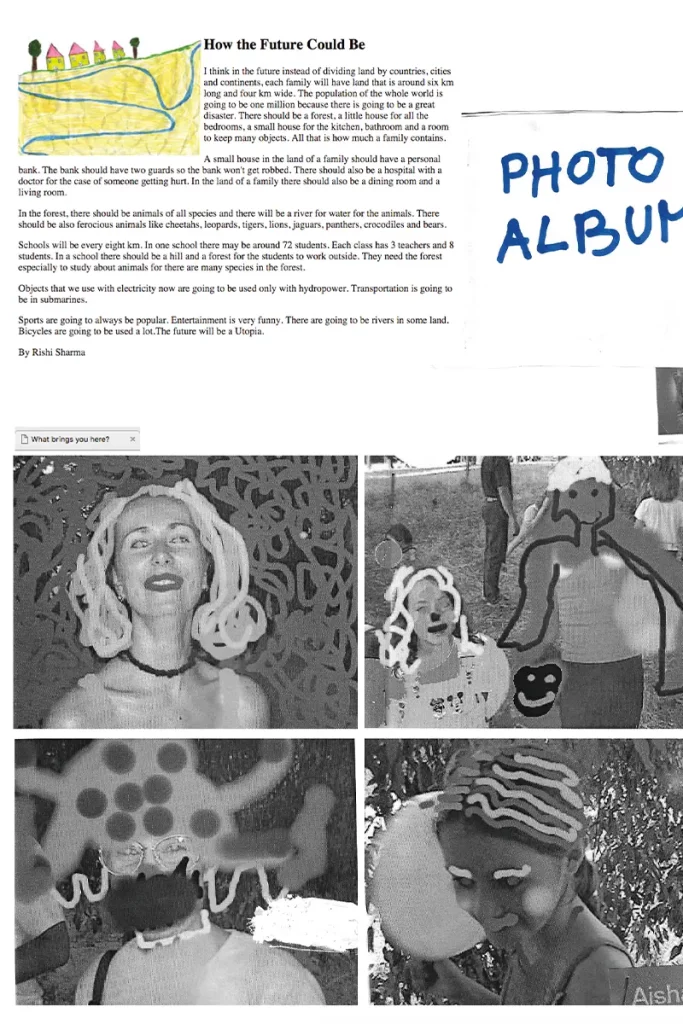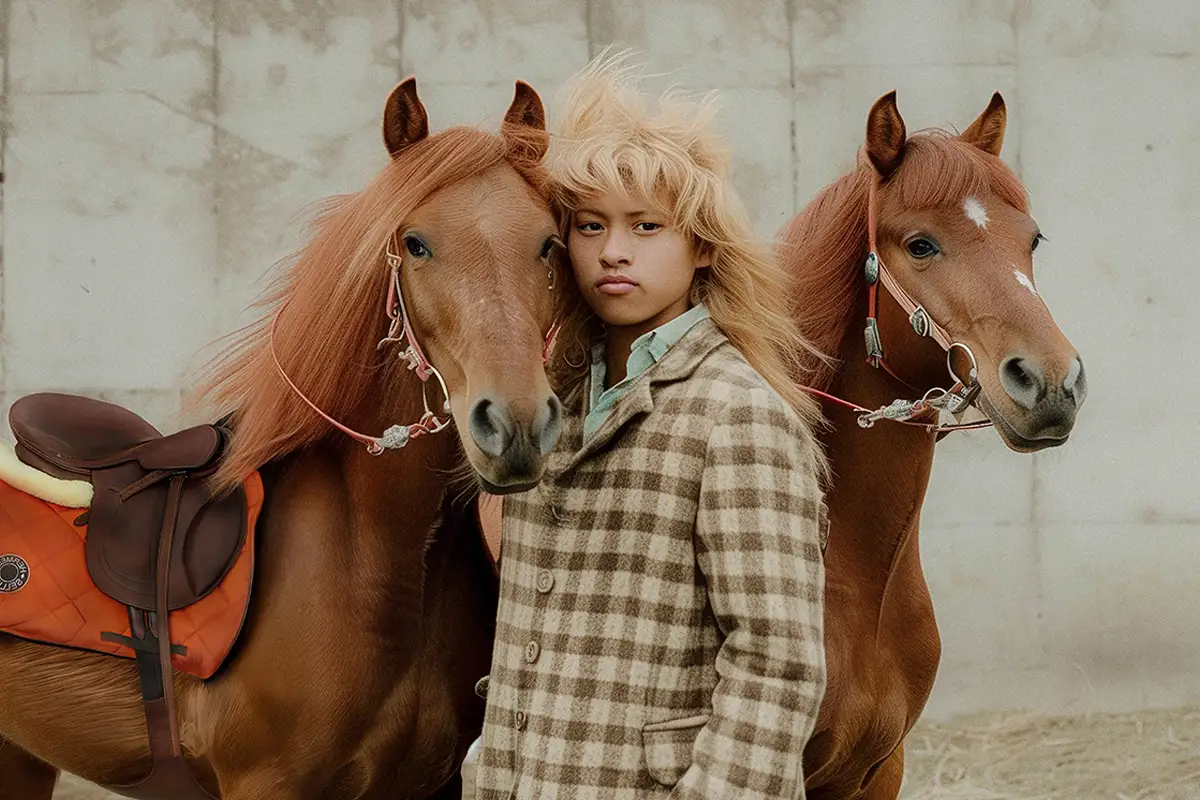Cringe, femicide, and upper class vulgarity. Jezabelle Cormio, founder of the knitwear brand Cormio, sharing anger and strength with her political commitment in fashion
Jezabelle Cormio for Lampoon sharing anger towards cringe, femicide, and upper class vulgarity and political commitment in fashion
cringe, femicide, and upper class vulgarity: an anthology of the present. While other types of crime were decreasing, male violence against women remained the same or even increased. The media played a role in this, inundating us with stories of gang rapes and femicide. These factors fueled my rage, which I wanted to express in our last show
Jezabelle Cormio: the designer creative process from knitwear to Tyrolean references, doodling and collecting stuff
It all started with some documents I had saved on my hard drive. Stuff I hadn’t looked at in years. There’s this one image: it’s from my early experiments with Photoshop back when I was a kid, doodling over pictures at my mom’s office. It’s like following my instincts on the computer, connecting the dots between my creative journey from when I was twelve up to now. My creative process often begins with something that makes me cringe or triggers me. Avril Lavigne checks all those boxes.
I haven’t decided that one season will focus on Flemish painters. I tend to collect things that resonate with me from the news or our culture over time. I try to be sensitive and save things, even if they’re not masterpieces. I don’t start with something sophisticated, because it’s harder for me to contribute if it’s too grand. I prefer to build something from my own research, so it stays raw and unprocessed. I also engage in discussions with friends, exploring new angles and avoiding retracing someone else’s footsteps too closely.
Iran protests it’s a matter of womanity: the political commitment of fashion
Fashion should have a strong social and political commitment in fashion. The riots in Iran are something I had been thinking about for a year, it’s about womanity. I found the reactions to women removing their scarves and the killings in custody to be messy and disproportionate. It made me wonder, what was driving these behaviors? Then I started pondering fear. I collaborated with Ehsan Sefat on this concept of fear as a comedy trick, resulting in graphics like boo and why are you scared for the collection.
I even considered Halloween as a theme for a collection. A Margaret Atwood quote, men are afraid that women will laugh at them, and women are afraid that men will kill them. In Italy, while other types of crime were decreasing, male violence against women remained the same or even increased. The media played a role in this, inundating us with stories of gang rapes and femicide.
Digging into the Tyrolean culture: Italian fashion according to Jezabelle Cormio
South Tyrolean culture and craft culture are always intriguing to me. It’s not a strategic choice, but more of an ongoing interest. In Italy, which is only a small part of Tyrolean, you’ll find Tyrolean elements everywhere. It doesn’t clash with the Italian aesthetic; it’s a refined way of incorporating folklore into their surroundings. I think the Italian upper class adapts tyrolean references as a way to elevate itself from popular preconceptions and signal wealth and culture. It’s about purity, healthiness, and idyllic mountain living. They’ve managed to maintain a high status for folk clothing. I don’t really care to preserve that status but rather have fun dismantling assumptions.
Jezabelle Cormio – knitwear in woman knowledge
When I started my brand, I didn’t have a plan for approaching knitwear. It’s a specialized field, and many people either work exclusively on knitwear or avoid it altogether. I met someone who had experience working with Shimaseiki, a Japanese machine manufacturing company. They recommended a few small factories, which I started working with. I continue to work with them today. The knitwear industry isn’t always forgiving to those who are unfamiliar with it: while you don’t need to know every detail of how the machines work, you do need to understand different gauges and how threads behave.
Much of this knowledge comes from hands-on experience. If you’re not well-versed in knitwear, you need to collaborate with a factory that is. Sometimes, it’s a joint design process where I bring an idea, and we work together to define the details. Other times, I draw inspiration from their archives, and we adapt it to meet my needs.
Motherhood and the woman’s condition. Jezabelle Cormio and the womanity commitment in fashion
I admire Lucien Lelong, drawn to his late Thirties collections. Todd Oldham is another reference. I also have classmates I admire out of all the Antwerp graduates – Jurgi Persoons. When I was younger, I didn’t have much guidance, so I chose my path based on what I saw in books about the best new designers. Central Saint Martins and Antwerp were mentioned, so I pursued that route.
Motherhood has connected me with the world around me. It forces me to engage with aspects I might have otherwise avoided, like the public sector and services. It has heightened my awareness of where women stand in society. Even those who seem cool with it sometimes reduce me to a two-dimensional character, saying, You can’t come out with us; you’re a mom today. I’m always a mom, whether I’m clubbing or working late at the office. There’s resistance to the idea that you can be a mom and other things at the same time.
Cormio: its roots in womanity and women expertise: knitwear at the center
Jezabelle Cormio is the founder of the homonymous brand Cormio, a Neo-Tyrolean world. The brand stands out for its ironic, folkloristic mood: a large part of the collection is inspired by Tyrolean aesthetics, somehow familiar to every Italian. Each garment, entirely made in Italy, embodies the combination of tradition and modernity, always putting at the center gender knowledge, like knitwear expertise and issues like womanity and filling the gender gap.




















